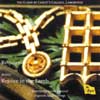Britten Rejoice in the Lamb; Howells Requiem
Christ’s College Choir prove themselves worthy of comparison with the best
View record and artist detailsRecord and Artist Details
Composer or Director: Benjamin Britten, Herbert Howells
Genre:
Vocal
Label: Regent
Magazine Review Date: 3/2003
Media Format: CD or Download
Media Runtime: 65
Mastering:
Stereo
DDD
Catalogue Number: REGCD169

Tracks:
| Composition | Artist Credit |
|---|---|
| Requiem |
Herbert Howells, Composer
Cambridge Christ's College Choir David Rowland, Conductor Herbert Howells, Composer Julian Collings, Organ |
| Take him, earth, for cherishing |
Herbert Howells, Composer
Cambridge Christ's College Choir David Rowland, Conductor Herbert Howells, Composer Julian Collings, Organ |
| Here is the little door |
Herbert Howells, Composer
Cambridge Christ's College Choir David Rowland, Conductor Herbert Howells, Composer Julian Collings, Organ |
| (A) Spotless Rose |
Herbert Howells, Composer
Cambridge Christ's College Choir David Rowland, Conductor Herbert Howells, Composer Julian Collings, Organ |
| (A) Hymn to the Virgin |
Benjamin Britten, Composer
Benjamin Britten, Composer Cambridge Christ's College Choir David Rowland, Conductor Julian Collings, Organ |
| Te Deum |
Benjamin Britten, Composer
Benjamin Britten, Composer Cambridge Christ's College Choir David Rowland, Conductor Julian Collings, Organ |
| Rejoice in the Lamb |
Benjamin Britten, Composer
Benjamin Britten, Composer Cambridge Christ's College Choir David Rowland, Conductor Julian Collings, Organ |
Author: John Steane
The chapel of Christ’s College was not, I’m afraid, on the itinerary of prepared visits to choral evensong in Cambridge as written up in my January 2002 ‘Singertalk’ article. Next time it must be. This is a choir with accomplishments which match those of several, more widely known, from other colleges. They are clearly under good direction, producing fine, evenly textured sound, singing with point and precision, shading sensitively, sustaining long phrases and solving very successfully any problems that may have arisen concerning intonation.
They also offer an extremely attractive programme, though all of the music here has been recorded many times. While the combination of two composers may widen the general appeal, in another sense it doubles the limitation, for discs which confine themselves to a single composer will be more comprehensive and so establish a prior claim. Thus, Christ’s, in both Howells and Britten, come up against their not distant neighbour St John’s, who have most of what is included here and quite a lot besides; their Howells record, for instance, has also the St Paul’s Evening Service and Like as the hart, and their Britten the Missa brevis and Festival Te Deum. One grounds of contents, those would be the prime recommendations.
A comparison of performances and recorded sound then follows, and though the outcome is not all on one side, it generally favours St John’s on Naxos. Howells’ Requiem and Take him, earth, for cherishing are both quite rightly slow; but in markings such as Quasi lento, serioso, ma con moto, Howells showed himself aware of a danger of stagnation which (however it may seem at the beginning) one comes by the end to find better averted by the quicker tempo and more urgent style of St John’s. In Britten’s Rejoice in the Lamb, St John’s are much helped by the recording, which places the choir in a more forward position so that the words (in the ‘Nimrod’ number, for instance) are in sharper focus. One gain for the new record in comparisons comes with the 1934 Te Deum, highly effective in the subdued excitement of its opening and in the organist Julian Collings’ keen articulation of the pedal line.
They also offer an extremely attractive programme, though all of the music here has been recorded many times. While the combination of two composers may widen the general appeal, in another sense it doubles the limitation, for discs which confine themselves to a single composer will be more comprehensive and so establish a prior claim. Thus, Christ’s, in both Howells and Britten, come up against their not distant neighbour St John’s, who have most of what is included here and quite a lot besides; their Howells record, for instance, has also the St Paul’s Evening Service and Like as the hart, and their Britten the Missa brevis and Festival Te Deum. One grounds of contents, those would be the prime recommendations.
A comparison of performances and recorded sound then follows, and though the outcome is not all on one side, it generally favours St John’s on Naxos. Howells’ Requiem and Take him, earth, for cherishing are both quite rightly slow; but in markings such as Quasi lento, serioso, ma con moto, Howells showed himself aware of a danger of stagnation which (however it may seem at the beginning) one comes by the end to find better averted by the quicker tempo and more urgent style of St John’s. In Britten’s Rejoice in the Lamb, St John’s are much helped by the recording, which places the choir in a more forward position so that the words (in the ‘Nimrod’ number, for instance) are in sharper focus. One gain for the new record in comparisons comes with the 1934 Te Deum, highly effective in the subdued excitement of its opening and in the organist Julian Collings’ keen articulation of the pedal line.
Discover the world's largest classical music catalogue with Presto Music.

Gramophone Digital Club
- Digital Edition
- Digital Archive
- Reviews Database
- Full website access
From £8.75 / month
Subscribe
Gramophone Full Club
- Print Edition
- Digital Edition
- Digital Archive
- Reviews Database
- Full website access
From £11.00 / month
Subscribe
If you are a library, university or other organisation that would be interested in an institutional subscription to Gramophone please click here for further information.




